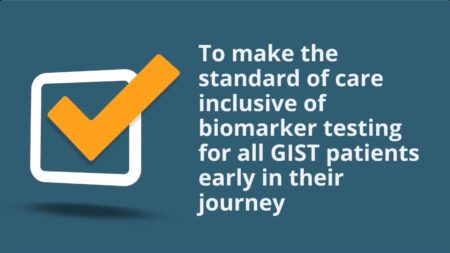It’s #TimeToGetTested
Understanding the role of mutations and biomarker testing is one of most important things patients must learn. Uncovering the driving force behind each individual’s tumors is not just important, it is critical. Biomarker testing is an opportunity to improve and optimize treatment – possibly avoiding unnecessary treatments and getting to the right treatment sooner. Currently, biomarker testing rates in the gastrointestinal stromal tumor patient population are relatively poor – only about 26.7% of patients have had testing done. The Life Raft Group Patient Registry, which is a group of extremely proactive patients, notes only about 53% of patients are aware of their mutation.
This is why the LRG is launching the It’s Time campaign. It is time to stop talking and take action to assure patients get tested. The goals of this campaign are to improve the understanding of biomarker testing in the cancer community and increase the number of patients tested.
In this post, we talk about including biomarker testing as the standard of care for all GIST patients.
It’s time to make the standard of care inclusive of biomarker testing for all GIST patients early in their journey!

Recently, VP of Program Services Sara Rothschild interviewed Dr. Richard F. Riedel, Associate Professor of Medicine, Duke University School of Medicine and Duke Cancer Institute about the role of biomarker testing in GIST. He is also is a member of the NCCN Soft Tissue Sarcoma Panel and the NCCN Gastrointestinal Stromal Tumors (GISTs) Panel. NCCN’s (National Comprehensive Cancer Network) vision is to define and advance high-quality, high-value, patient-centered cancer care globally.
How can we make biomarker testing the standard of care early in the treatment journey?
Testing should be considered for all patients considered for systemic therapy. Anyone with intermediate/high risk features with respect to risk of recurrence should be tested. We need to identify patients who would not benefit from adjuvant therapy. Similarly, in the advanced or metastatic setting, if considering imatinib in the frontline setting, we need to have considered mutational testing for same reason and we should consider mutational testing for individuals who would benefit from dose escalation. Testing should be routinely performed for patients considering systemic therapy, either in the adjuvant or frontline metastatic setting.
Where do you see the future of testing going?
We have learned a lot over the last few years, but we know that there is more to learn about mutational testing. We have learned about development of secondary mutations for KIT/PDGRa. We have also learned about differential sensitivity with subsequent lines of therapies. The further development of liquid biopsy will come to the forefront in coming years. FDA approved agents were studied with no assessment of mutational status at all. While this led to approval and benefited individuals, the questions now are, “Can we be smarter? What is the role for repeat testing for subsequent lines of therapy? How can we tailor the therapy with subsequent lines of therapy?” These aspects have not been studied robustly enough and I would like to see these questions answered. We could leverage subsequent lines of therapy better than what we are doing now.
How do we guide community physicians about the importance of testing?
This is challenge with rare diseases. With community physicians who may see a couple of cases per year, it is not clear if they have knowledge of 3rd or 4th line therapy. The educational component is important to encourage community-based practices to partner with academic centers. I worry about robust efforts with community doctors as there is so much to know and they are largely focused on the more common diseases. It would be important to partner with an academic center and build those relationships and then the education will come as that is our strategy at Duke.
Many patients will come to my practice from the community with testing already performed. Part of that is the strength of NCCN guidelines, part is patients advocating for themselves, and part of that is robust efforts like patient advocacy groups like The Life Raft Group. It is a multi-pronged approach but clearly we still have more improvements to make.
 Dr. Richard Reidel, Duke Cancer Center
Dr. Richard Reidel, Duke Cancer Center
Dr. Riedel is an Associate Professor with tenure in the Division of Medical Oncology at Duke University Medical Center and the Associate Director for Clinical and Translational Research for the Sarcoma Program at Duke Cancer Institute. He also serves as the Program Director for the Duke Hematology-Oncology Fellowship Program. Dr. Riedel is a member of the NCCN Soft Tissue Sarcoma Panel and the NCCN Gastrointestinal Stromal Tumors (GISTs) Panel. Dr. Riedel’s clinical and research interests focus on identifying novel therapeutics for patients with soft tissue and bone sarcoma. He is an active participant in Sarcoma Alliance for Research through Collaboration (SARC) and serves on the medical advisory boards for the Sarcoma Foundation of America and the National Leiomyosarcoma Foundation. He is a member of the American Society of Clinical Oncology (ASCO) and the Connective Tissue Oncology Society (CTOS) and previously served as Chair of the ASCO Education Section for sarcoma. He is currently a member of the ALLIANCE Sarcoma Working Group and serves as Co-Chair for the ECOG Sarcoma Working Group.
If you would like to talk to someone about mutational testing, please contact our Director of the Life Raft Group Patient Registry, Denisse Montoya at dmontoya@liferaftgroup.org
Special thanks to the sponsors of this initiative:





